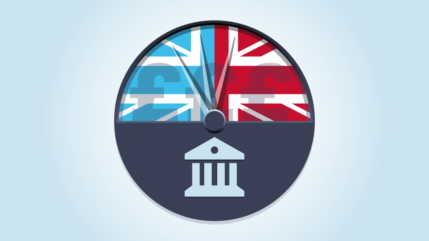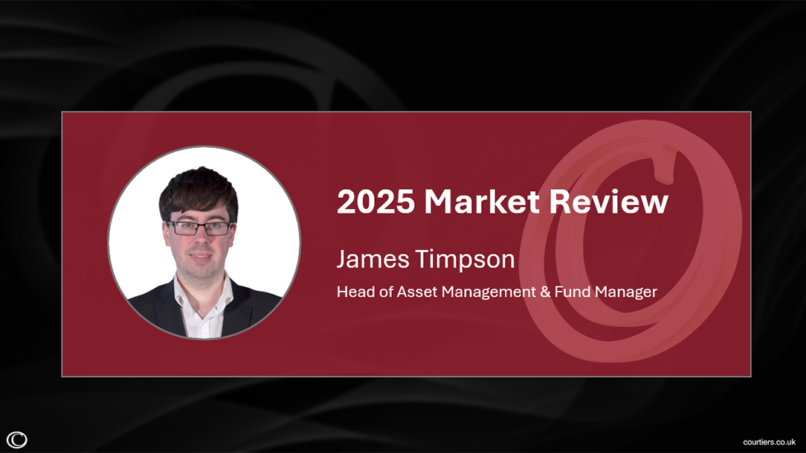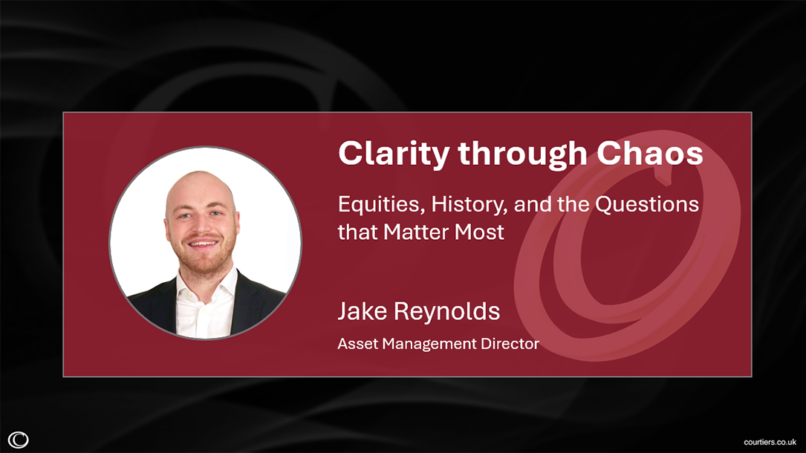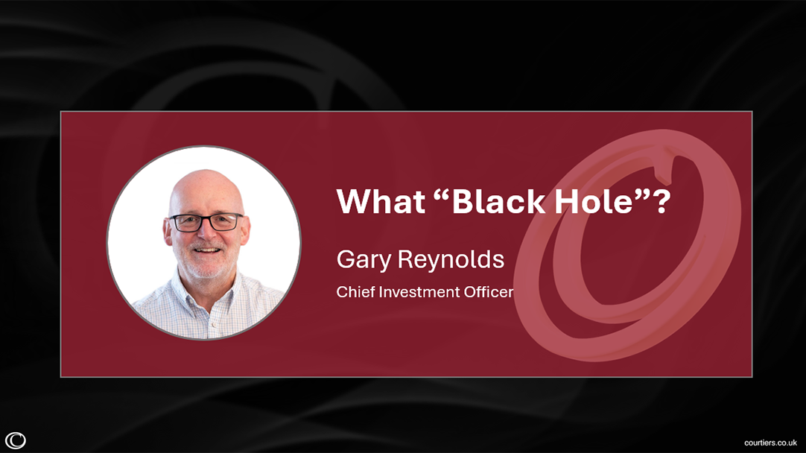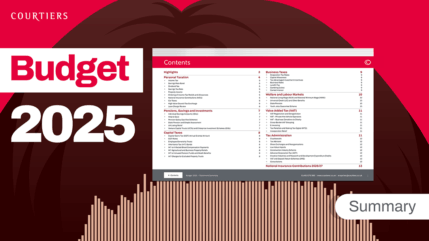News & Insights
9 Brexit Questions – Interview with Gary Reynolds, Courtiers CIO
Transcript of video:
What might happen to the British pound?
If the UK leaves the EU I think the smart money is on a weaker sterling because the uncertainty it would create would force markets to re-price. The other issue with sterling is that this country runs a big deficit. We’ve got a trade imbalance so we run a negative current account balance. And the theory is, over the very long term, large current account deficits put downward pressure on the currency of the nation that’s running that deficit. We are one of the biggest current account deficits in the world relative to GDP [Gross Domestic Product], so you’d be brave to bet on sterling with an exit. And actually, you’d be brave to bet on sterling if we stay in too.
I think the pound may have a bit of readjusting to do.
Might the UK ever adopt the euro?
I think there are lessons that this country has learned from the fiasco that is the euro – and it is a fiasco. I think if the Bundesbank could have had a crystal ball and looked into 2016 before Germany adopted the euro, and saw what was happening now, I don’t think Germany would ever have given up the deutsche mark, ever.
And bearing in mind that the one thing that has unified British chancellors, at least over the last two decades, notwithstanding that Lawson was always trying to get closer in his currency union (he seems to have done a complete about turn on that now), most chancellors, including Gordon Brown, were intent on staying out of the euro.
And the control that we’ve had, post the global financial crisis, of our own currency and our own quantitative easing programme, is only possible if you keep the pound.
I don’t think there is a snowballs chance in hell that a UK government will give up the pound any time in my lifetime anyway.
How might an exit impact Courtiers clients’ investments?
I think what a client would see if the UK exits is some volatility and it’s very difficult for us to control that absolutely.
I think our clients understand that we do a lot of work on the fundamentals and that’s designed to give stability over the very long term.
Our clients have long term goals. I can hit those twenty, thirty years out, but tomorrow’s goal is tough if I’m just trying to make sure that the portfolio doesn’t wobble. And what you sacrifice in return for the better prospects over the long term is more wobble in the short term.
Now, there are times when we’ve been quite bullish on markets, especially after crisis – latter part of 2011, 2012 – even after – there was a readjustment of US markets because the US got downgraded. We were very positive. We had lots of equities in the portfolio.
This time around we’re being more guarded. We’re trying to keep the volatility under control. We’ve got puts in place, particularly for Cautious and Balanced portfolios, so if there’s a major collapse we’ll alleviate the effects of some of that, and we haven’t got as much equity in our Growth portfolio as we’ve had traditionally.
But we always have to ask ourselves, “What if the UK stays in and there’s a market recovery? We don’t want to miss that,” so we’re being sensible. It’s a bit of a Goldilocks portfolio at the moment; not too hot, not too cold.
What about clients with assets in the EU outside of the UK?
I think there will be some deal done for people that have got assets overseas in euros.
I don’t think that the European countries will be forcing Brits already resident there out. What’s the point? They don’t want that capital to be migrating back to the UK and moving out of their country. So I think that will be OK.
And I also suspect that longer term, the euro may do better than sterling. So actually, those foreign assets might get a decent currency turn.
It can go the other way of course. But, when you go back to this issue of the UK’s current account deficit, I think it’s more likely that the euro will strengthen in the long run against sterling than the other way around.
How might the EU referendum affect UK interest rates?
I think when you’re looking at the European effect on UK interest rates, and the decision of the referendum and how that will affect UK interest rates, you’ve got to look at it from the point of view that we’ve had a 0.5% percent base rate for over seven years. Unthinkable.
We’re at the lowest level since the Bank of England was founded in 1694, over the most stable period, so UK interest rates are rock bottom. And, the recent evidence of countries that have pushed their rates negative – Japan, and to a large extent Europe – is that it doesn’t necessarily work.
There comes a point where negative rates become ineffective. So, I think what you’ve got to bear in mind is, UK interest rates are likely to go up irrespective of what happens.
But, I suspect if we vote to come out, the bond market will be volatile, long dated gilts will fall in value, which will push up long term UK interest rates, and that will be bad for bond holders.
How might other EU members respond to a UK exit?
Europe clearly doesn’t want the UK to come out.
It’s the second biggest economy, it provides a lot of benefits – it provides a lot of financial expertise to the EU. But also, if the UK comes out, it puts an element of doubt of the permanency of EU membership. So, they’ll be worrying and thinking, “What is the next country to come out?”
I think the response by the EU will be to accelerate their move towards federalism. Those members of the euro will get closer and it might actually drive the political and fiscal union that’s needed to have a single currency. And if I just explain what I mean by that – in the UK, we do not count the pounds in and pounds out of our different regions. We suspect there’s a bit of a subsidy of the south to the north (and there is at the moment) but historically there’s also been a subsidy of the north to the south, so it moves around but we don’t count.
We don’t say that one part of Britain has a deficit versus another part of Britain. That is because we have a proper single currency. In the Eurozone, you don’t have that. We do count. The countries count. Greece is running the deficit and owes the rest of the EU members more money and so it doesn’t work.
You’ve got to get a political and fiscal union for the euro to work and I suspect if the UK comes out (bearing in mind that we are also a drag on the move towards federalism) the EU will accelerate that process.
Which scenario would Courtiers prefer?
So, the scenario that Courtiers would prefer is the one that maximises our clients’ wealth and in the short term, I suspect that that would be better for staying in because I can see less volatility and more certainty.
In fairness in the long term, nobody knows. So, I can’t tell you whether the in or out scenario will produce a more vibrant UK economy and therefore a better return on our clients’ assets in ten years, and no one will ever be able to answer that question because whether we come in or out you’ll never know in ten years time what the alternative would have been.
But if I’m being honest, bearing in mind that our job is to balance the risks against the returns for our clients, short term I would prefer in, mainly because I think the path to going out is extremely uncertain.
You’ve got a majority government that wants to stay in. Could Cameron stay in power? Could Osborne stay in power? The Labour party wants to stay in, so there will be ramifications for the opposition if there was an out vote. The SNP definitely wants to stay in and will almost certainly go back to the Scots and ask for a vote on secession of the Union – again – if the UK votes to come out.
So, it’s not just the European issue you have to look at, it’s the domestic issue and the uncertainty that you would have if your majority government that wanted to stay in was beaten in the referendum because then they they’ve lost credibility and power. They would be a lame duck government and that has all sorts of other ramifications, notwithstanding the fact also, that who would be the next prime minister in those circumstances? And that raises a few alarm bells too.
How is Courtiers responding right now?
Unusually, we have to be more aware of the short term, and it is very very difficult to manage, against a political risk.
It looks like we’re going to have to do this with the referendum on the 23rd June in the UK, and we’re going to also have to have a look and see what’s happening across the Atlantic, because it now looks like it will be Trump vs Clinton in the presidential election. And, believe me, that’s going to create some uncertainty as well.
You’ve got two of the most unpopular candidates ever contesting the presidency, and that’s going to have some ramifications.
So this is, for me, the type of year I dread. I prefer the years when you’re coming out of a problem, you can see value and you know in the long run that value is going to be realised. This is a little more difficult.
We’ve not had to change our long term view – that still tends to favour US equities versus others – and what’s happening with the referendum makes that view even more logical.
But, we’ve had to get in place some protection. And I think we’ve been prepared to run, well we have been prepared to run, our foreign currency position a little longer, because I think the first place you’ll see a wobble if Britain comes out will be in the value of the pound. So we use that long dollar position as a hedge.
Any advice for Courtiers clients?
My advice to clients would be to do what they always do.
We will adjust the portfolios to the immediate circumstances and we have done that. It doesn’t mean we’re going to be right, but we’re trying to deal with the short term risks and mitigate some of them.
But like any other occasion, remember, we’re running our clients’ long term assets, and we’re generally taking risks with those assets. Not massive risks, they’re broadly diversified, but the value of the portfolios do go up and down.
So you should never have any money in those portfolios that you’re going to need to spend in the next few months or even the next two or three years. That fundamental philosophy of investing should never change, whether you’ve got a referendum or not. We’re looking at a risk at the moment, we’re looking at the referendum. But, in any day, at any time, if there were no risks perceivable, you never know what’s going to come up and catch you. You always have to be mindful. My advice would be, don’t do anything different.
Money you’re going to spend and need, keep safe in cash. Money that you’ve got for immediate capital expenditure, keep safe and in cash, and then the rest of it run for the long term and we’ll worry about the short term effects on markets.
Warning – the views expressed by Courtiers in this summary and any video and video transcripts, are reached from our own research. Courtiers cannot accept responsibility for any decisions taken as a result of reading this document, watching the featured video or reading the video transcript and investors are recommended to take independent professional advice before effecting transactions. The price of stocks, shares and funds, and the income from them, may fall as well as rise. Past performance is not necessarily a guide to future returns.
We do not endorse nor accept responsibility for the content of any website not operated by Courtiers which you may visit by following a link from this article.




